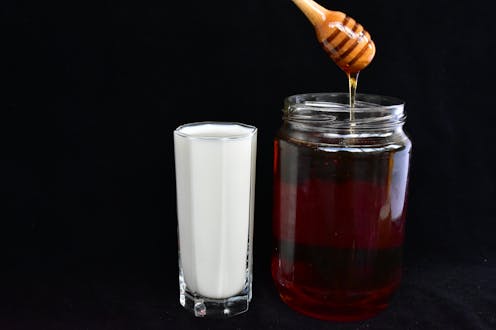Food fraud, the centuries-old problem that won't go away
- Written by Sunanda Creagh, Head of Digital Storytelling

What have you eaten today? And how much do you know about how it was produced, what was added to it along the way, and how it made its way to your plate?
Even as most of us grow increasingly removed from actual food production, many consumers still take food fraud and perceptions of food purity incredibly seriously.
Scandals around “meat glue” or milk and honey contamination, and the skyrocketing global interest in organic foods, underscore the fact that many of us still care quite deeply about the foods we eat and how they’re produced – and that’s affecting food labelling, regulation and consumer behaviour.
One person who’s studied that terrain closely is Dr Andrew Ventimiglia, a Research Fellow at The University of Queensland, who researches food fraud and how it relates to science, culture, trademark law and food regulation.
Read more: Trust Me, I'm An Expert: Cyclone season approacheth, but this year there's a twist
He sat down with The Conversation’s deputy politics and society editor Justin Bergman to talk about the weird history of food adulteration and certification – everything from 19th century dairy farmers adding sheep brains to skim milk to make it look frothier, to centuries-old oil and wine adulteration scandals.
Dr Ventimiglia said types of food fraud laws have been recorded as early as the 13th century, but the issue really came into focus in the 1800s.
Adulterated milk was one of the first issues that got national attention, and this was roughly in the mid 1800s to late 1800s, both particularly in the UK and the US. And the earliest form of adulterated milk that was really concerning to regulators was actually simply skim milk.
Producers who were making skim milk were adding flour or starch, sometimes carrots for sweetness, but they were also adding things that did pose a public health risk.
So, for instance, chalk was added to increase the whiteness of milk, as well as often sheep or calf brains to froth the milk […] those posed really legitimate health risks that were recognised by early analytic chemists and that really initiated some early food regulations.
And while food scandals persist today, food standards are increasingly more concerned with fraudulent claims on packaging and innovations in food production. For instance, is yoghurt made with coconut milk still considered yoghurt? What to do about foods that claim to be “all natural?”
Special thanks to our multimedia intern, Dilpreet Kaur Taggar, for editing this segment together.
From food adulteration to food poisoning
We also hear from Associate Professor Shauna Murray from the UTS Plant Functional Biology and Climate Change Cluster, about her research into ciguatera fish poisoning. It’s a non-bacterial illness associated with fish consumption and symptoms in humans may include gastrointestinal, neurological and even sometimes cardiovascular problems.
Editorial intern Jordan Fermanis spoke to Dr Murray about why this tropical disease is showing up further south, and how recreational fishermen are helping researchers unlock the mysteries of ciguatera.
Trust Me, I’m An Expert is a podcast where we ask academics to surprise, delight and inform us with their research. You can download previous episodes here.
And please, do check out other podcasts from The Conversation – including The Conversation US’ Heat and Light, about 1968 in the US, and The Anthill from The Conversation UK, as well as Media Files, a brand new podcast all about the media. You can find all our podcasts over here.
Additional audio and credits
Additional editing by Dilpreet Kaur Taggar
Kindergarten by Unkle Ho, from Elefant Traks
Free Music Archive: Podington Bear, Clouds, Rain, Sun
Demand increases for organic produce, 23 ABC News.
Is your honey real honey or just “sugar syrup”? ABC News Australia.
Fake honey: Study finds disturbing results, ABC News Australia.
Meat glue secret, Today Tonight.
Chinese milk report, CNN.
Missouri Wine History, MissouriWine.
Pure. Fresh. Milk. 1991 Promo.
Australian milk ad.
Sad Marimba Planet by Lee Rosevere from Free Music Archive
Authors: Sunanda Creagh, Head of Digital Storytelling





